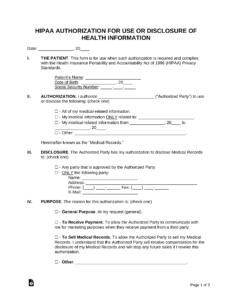The HIPAA data retention policy template is a document that outlines the procedures and guidelines for retaining and destroying protected health information (PHI). It is important to have a data retention policy in place to ensure that PHI is kept secure and confidential and to comply with HIPAA regulations. Creating a HIPAA data retention policy template can be complex and time-consuming, but it is a vital element of a comprehensive HIPAA compliance plan. Fortunately, many resources are available online to help you draft a policy that meets your organization’s needs.
By searching online, you can find free and paid HIPAA data retention policy templates that offer guidance on creating a policy tailored to your organization’s specific circumstances. Additionally, guidelines from the Department of Health and Human Services Office for Civil Rights and other regulatory bodies provide valuable insight into developing a compliant policy.
Policy Elements
Introduction
Begin by outlining the purpose and scope of the policy, including the types of PHI covered, designated responsible individuals, and applicable locations and systems. Clearly define what constitutes PHI under HIPAA regulations.
Retention Periods
Specify the retention periods for different types of PHI in accordance with applicable regulations, laws, and industry best practices. Outline the criteria for determining retention periods, such as the purpose of the data, legal requirements, and business needs.
The policy should document the processes for securely storing PHI during the retention period, ensuring its integrity and confidentiality. Detail the physical and electronic security measures employed to protect PHI, such as access controls, encryption, and regular security audits.
Disposal Procedures
Outline the procedures for destroying PHI once the retention period has expired. Specify the authorized methods for disposing of PHI, including shredding, incineration, or secure electronic data deletion. Ensure that these methods comply with HIPAA regulations and state or federal laws regarding the disposal of confidential information.
Establish a regular review process to evaluate the effectiveness of the data retention policy. Review the policy periodically to ensure that it remains compliant with changing regulations and industry standards. Monitor the implementation of the policy and address any identified gaps or areas for improvement.
Implementing the Policy
Communication and Training
Communicate the policy to all relevant employees and stakeholders to raise awareness and ensure compliance. Conduct regular training sessions to educate staff about their roles and responsibilities in adhering to the data retention policy. Provide clear instructions on how to access, store, and dispose of PHI securely.
Monitoring and Auditing
Establish a system to monitor compliance with the data retention policy. Regularly review activities related to data retention, such as access logs, disposal records, and training participation. Conduct periodic audits to ensure that the policy is being followed effectively and address any identified issues promptly.
Document all instances of PHI access, use, and disclosure. Maintain accurate records of who accessed PHI, when they accessed it, and the purpose of the access. Regularly review these records to identify any suspicious or unauthorized activity.
Conclusion
The HIPAA data retention policy template is an essential component of a comprehensive HIPAA compliance program. By following the guidelines and incorporating best practices, organizations can develop a policy that ensures the secure retention and disposal of PHI while adhering to regulatory requirements. It is crucial to regularly review and update the policy to maintain compliance and protect the privacy and security of patient information.
The HIPAA data retention policy template serves as a foundation for organizations to establish a comprehensive approach to managing and safeguarding PHI. By implementing the policy effectively, organizations can mitigate risks, protect patient data, and demonstrate their commitment to maintaining compliance with HIPAA regulations.
FAQs
What is the purpose of a HIPAA data retention policy template?
The HIPAA data retention policy template provides guidelines for organizations to securely retain and dispose of protected health information (PHI) in compliance with HIPAA regulations.
Who should use a HIPAA data retention policy template?
Any organization that handles PHI, including healthcare providers, insurers, and business associates, should use a HIPAA data retention policy template.
What are the key elements of a HIPAA data retention policy template?
The key elements of a HIPAA data retention policy template include defining PHI, specifying retention periods, outlining disposal procedures, and establishing a process for reviewing and updating the policy.
